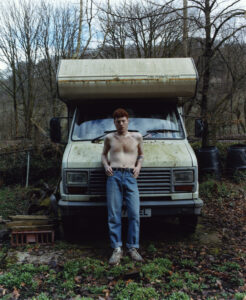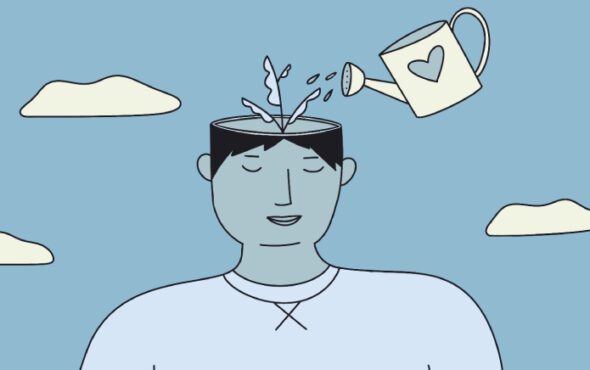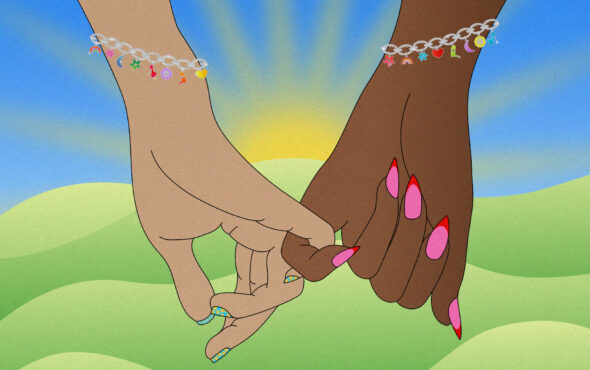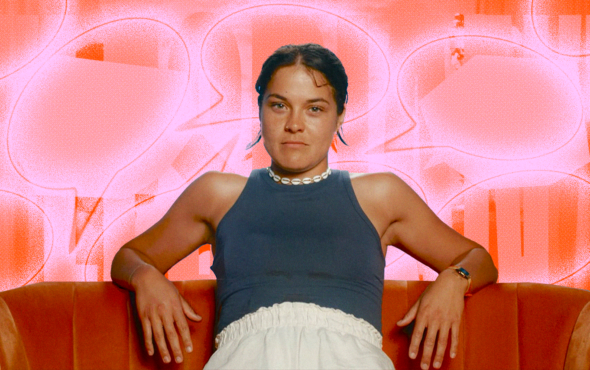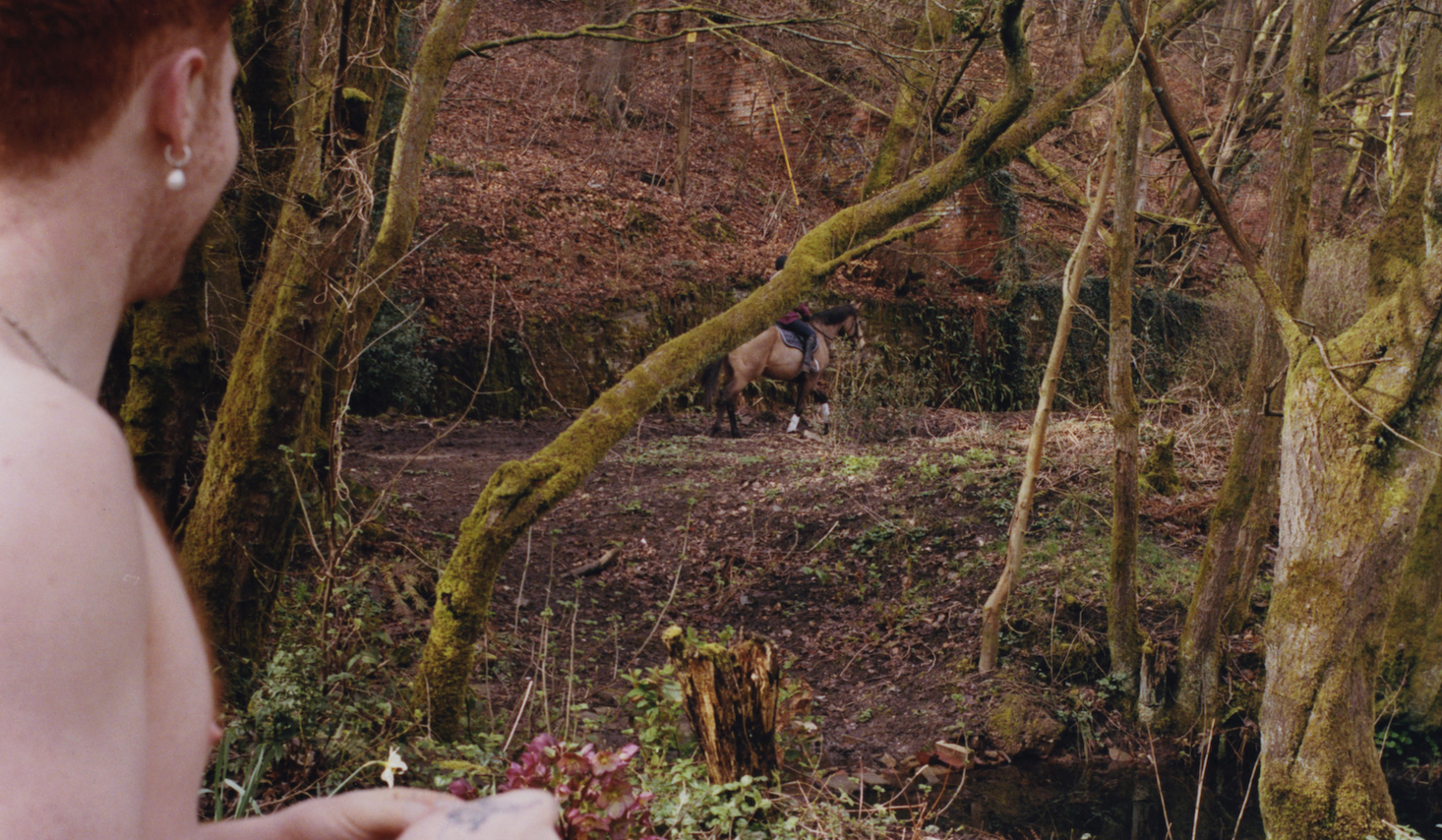
Calderdale. Situated in the heart of West Yorkshire with picturesque rolling hills and laced with striking former textile mills, it’s a characterful town with a population to match.
I spent the entirety of my adolescence and early adulthood calling Halifax in Calderdale my “home”. My family and core friendship group still live there and I consider it to be one of the most visually beautiful places I know. But despite the scenic landscapes and historic Victorian architecture, growing up in the area, I felt othered. There were very few queer people around that I could relate to, and definitely no older LGBTQIA+ individuals that I could use as a blueprint for living a fulfilling life in the area. At that time, there were no local safe spaces, no queer youth clubs, and Grindr (which was still relatively new at the time) was filled with blank profiles and dead end conversations. It’s a familiar story that I hear from so many queer people who grew up in towns or villages across the North of England during the noughties and 2010s – and this is without even mentioning the instances of homophobia that feel so prevalent in rural areas but often go unreported and are so easily accepted as the “norm”.
With that, it’s no surprise that so much of queer culture comes to life in cities. Many of us seek out the nearest cosmopolis, craving some sense of community that is more easily attainable in concrete jungles like London, Manchester and Birmingham. We happily shed our rural roots to start new lives in places where we feel seen, whether that be through nightlife, art spaces or the simple fact that there are just more queer people – safety in numbers, so to speak.
Dreams of moving to London had manifested in my mind before I’d even hit puberty. So much of that idea was rooted in escapism – I had this sense that by “fleeing” to the capital, I’d leave behind the sense of isolation and otherness that had clung to me for as long as I could remember. The notion of leaving almost became a coping mechanism; “I’ll soon be old enough to leave and everything will be fine.” This negative association with Halifax has meant that, despite it being over a decade since I left, I still feel conflicted about the area. In my head, it’s still exactly the same as it was in the early 2000s, frozen in time and left behind while the rest of the world moved on.
On paper, Calderdale has progressed massively in recent years. It has since acquired its very own gay club, drawn mass queer tourism thanks to the HBO/BBC show, Gentleman Jack and even launched its own Pride celebrations which are attended by hundreds of LGBTQIA+ individuals and allies from the area. But while I can see from the safety of my detached London life that it’s getting easier to be queer and happy in Halifax, I can’t seem to let go of the past.
In recent years, I’ve felt some ominous pull back towards my hometown, like a sailor to a siren song. And so this project is about re-conditioning myself to recognise that queer life doesn’t just exist at home, but it thrives. When fellow Halifax-born creative, the photographer Jesse Glazzard, and I first spoke about this portfolio as an initial creative idea, we realised that our home-coming was more an act of necessity rather than a passion project.
Through capturing queer people in and around Halifax, and hearing their stories of contentment in the area, we sought to reconnect with our homeland, and discover that queer fulfilment does exist from whence we came.
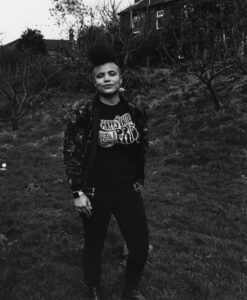
Terry Logan, 42
Terry Logan, 42, has lived in Calderdale for 12 years. A musician and teacher originally from Rochdale, she met her wife, Emma, in a gay bar while living in Manchester. The two back-packed across Latin America, lived and worked in Mexico for a year, all before returning and considering a move to the Calder Valley, inspired by many day trips and disco nights out at the esteemed Nelson’s Wine Bar.
“Hebden especially was always like a beacon of inclusivity. It is believed to be the lesbian capital of the UK, so the idea of holding my wife’s hand and just being ourselves and seeing that representation reflected back to you was really appealing,” she says of her decision to move to the area. “So when we came back from travelling, penniless and with nowhere to live, we just thought ‘Well we can live anywhere, so why don’t we find work in Hebden and live there!’”
For Terry, much of her life is dedicated to further pushing acceptance in the area. She’s part of the team at the brilliant Happy Valley Pride, a charity dedicated to celebrating LGBTQIA+ life in the area and whose agenda is to promote equality and diversity while eradicating discrimination based on sexual orientation and gender identity. They have a particular focus on arts, education and engagement, and have become a fundamental part of queer life in the area. They also host highly popular Pride events in the area during Pride Month. “My current role is as youth engagement officer. I’ve developed their educational outreach, so I’ve written a scheme of work around identity that’s focused on LGBTQIA+ issue and I’ve also created the PSHE curriculum which is about everyday understanding and learning for students.”
In her day job, Terry started out as an English teacher but now works in pastoral care at the local Ryburn High School. Part of her role has been facilitating a strong LGBTQIA+ group for students, where they’re encouraged to organise a week-long Pride event and connect with other schools to help spread wider understanding. The group also recently won the Young Champions of Calderdale award for their work, a “proud mum” moment for Terry. “I believe that Ryburn is now leading the way in terms of being an example of a school that celebrates diversity and inclusivity, and a large part of that is not me, it’s the kids! They’re brilliant students and they bring so much hope. They’re so brave and they are unapologetically themselves and, well, fabulous. The best way to be!”
It is people like Terry who are helping to lay the foundations for the next generation of queer individuals, but also the next generation of allies. She’s an example of a brilliant and informed ambassador for our community who is educating young people on what it means to be queer and how we can support our LGBTQIA+ peers. We rely on these individuals to help solidify the level of tolerance that will invite more queer people to feel safe and welcome in Calderdale – just like she does.
Having lived in Manchester, with the inviting security of Canal Street and its rich cultural music scene, I wonder what it is that has kept Terry and her wife Emma in the valley for all these years. “There’s a number of things and it’s not just about my queerness. Calderdale is a hotbed of creativity and I have been massively influenced by countless talented artists here. There are so many iconic venues such as the Trades Club and The Golden Lion,” she says. “Creativity being at the centre of our community fosters a sense of openness and acceptance.”
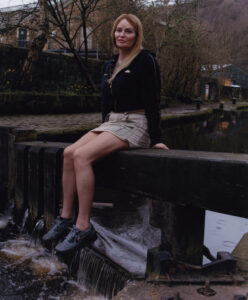
Kim Lana, 45
“I’ve not been eating biscuits!” Kim Lana, 45, exclaims regarding her photoshoot when we arrive at her flat to start shooting. An avid DJ, the space feels just as much a recording studio as it does a home, with a mixing desk and speakers taking over much of the living room. The walls are strewn with trans-related iconography, including framed magazine covers of her idol Honey Dijon and large colourful posters of the many queer music events at which Kim has played.
While DJing is her bread and butter these days, she formerly owned a cafe in the area. “With the cafe, I transitioned while serving ice cream out of a little hatch. Everybody saw that happen and that was very public. It wasn’t done on purpose, but I thought, ‘If I’m in this position to be this public, I might as well not hide anything – actually allow it to serve some greater purpose’”. In preparation for this portfolio, I’m told by a number of different people that I must speak to Kim – a testament to her impact on queer life in the area. She’s become a pillar of the community, known for her club nights but also the way in which she has become an embodiment of local trans visibility.
At the start of her transition, the cafe was vandalised with homophobic graffiti. It was shocking, not just to Kim, but also to the wider community. Since then, her ethos has been about making other trans people feel seen. While her events and DJ sets have brought joy to the queer community and beyond, she’s also played a part in more radical routes to trans visibility. Armed with spray paint, Kim recently took to the streets and started marking up lamp posts, road signs and bridges with the trans pride flag. She’s since seen her work immortalised on the screens of the BBC show Happy Valley (a particularly proud moment for Kim) and on the Instagrams of queer people who visit the area. “I bought some pink, some white and some blue spray paint and I just went out one night,” she beams. “If there’s a little Pride flag somewhere, you feel seen. Trans people coming to the area know that they’re not alone.”
Kim admittedly has a complex relationship with Calderdale. Having the cafe vandalised was just one of a few instances in which she has experienced hate crimes, but despite the tribulations, she’s been in the area for over 20 years, now living in the very centre of town. “I purposely moved and put myself in the middle of it. The cafe was in the middle of the park and my visibility had an impact. So I might as well embrace it and use it. I might not have money and I might not have influence, but if I can go into a space and hold that space, that’s empowering,” she tells me. “If I can be here and host gigs and hold space and try and attract other queer people to the area, that’s important!”
Most recently, Kim played a part in organising events surrounding Trans Day of Remembrance. It was a life-affirming moment for her – an opportunity to ensure that trans lives were at the forefront of cultural conversation across Calderdale. Kim was also supported by Happy Valley Pride, which helped to push the message even further. It’s just one example of the ways in which Kim is ensuring that trans issues are being brought to the forefront. “It was a space to grieve, but also to show that we want you to celebrate trans people,” she explains. “We want to be celebrated! And we want to be remembered! Trans women want it all… we want it fucking all!”
Jordan Roberts, 27
Jordan Roberts, 27, is a relatively new resident in Calderdale, having settled here just 6 months ago. After growing up in nearby Littleborough, his family moved to Kent for a number of years before he made the trip back North to live in Manchester. When an opportunity arose for him to help friends establish their local BnB, the Crow Nest House, he left the fast-paced city for a quieter life in Calderdale – and it’s been more cathartic than he had first imagined.
“In Manchester, there was this constant change and the speed at which things were going, it was too full on. I felt like I was going at a million miles an hour. As soon as I got here, it felt like I slowed down a lot in a very healthy way. It brought me back down to normality and I was like, ‘oh, this is the pace that life should be at.’”
Having had a more hedonistic lifestyle in the city, Jordan has yearned for something different, a break in the cycle that is expected of so many 20-something gay men – and Calderdale offered just that. He’s started to find his feet amongst a new community, one that isn’t so focused on relentless partying. There is however some anxiety that comes from leaving the accepting streets of Manchester and coming somewhere smaller and more tight-knit. “One of the things that you worry about when you leave the city is finding yourself in a place with small town mentalities and not finding acceptance,” he begins. “But, it’s been very accepting and that small town mentality doesn’t exist as much, which was quite a big contrast to what I experienced growing up in nearby Littleborough.”
Being in Calderdale, with its picturesque rolling hills and wide open spaces has meant that Jordan has had more time to focus his mind on creative endeavours. The area is known for its creativity, harvesting talent like screen-writer Sally Wainwright, poet Ted Hughes and his wife Sylvia Plath. A budding artist himself, Jordan hopes to bring some of his creative prowess to the local area too, particularly within his specialisms of photography and event production. “I don’t think I’ve showcased myself authentically creatively here yet, which is something that I’m plotting and planning,” he tells me with a knowing smile. “I’d like to get involved in Happy Valley Pride and just get more ingrained in what is going on here. I think once I understand the area a bit more and see what people are craving and what is missing, then I’ll know what I can bring to the table. I’d love to support existing local events and put on some of my own.”
Living in an area with a smaller queer population can sometimes leave little opportunity for romantic or sensual exploration. I wonder if that is something that Jordan is conscious of, being a young single gay guy and having moved from Manchester where there is much more opportunity for intimate connection. “I think it’s quite challenging to meet people. Don’t get me wrong, I’ve been on the apps, but I’ve been living in the city for long enough and the culture in the cities is lots of parties, drugs and hooking up. It’s nice to have a break from that.”
The tranquillity, the open space, the lack of distractions have all contributed to Jordan entering a better head-space, and working on the most important relationship of all: the one with himself. “I’m actually finding myself. For me, being here, it’s about rebuilding my relationship with me. That’s the most important thing right now.”
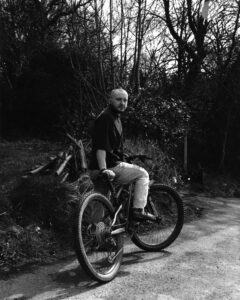
Noah Hill, 35
Throughout his life, Noah Hill, 35, has lived in a number of areas across Calderdale including Kings Cross, Sowerby Bridge and Ripponden. Over the past few years though, he’s firmly settled in Calder Valley with his boyfriend and two cats. There’s a trans pride flag confidently hanging in the downstairs window of his home – a testament to Noah living authentically and unapologetically and embracing his transmasculine identity.
An avid biker, he runs his own bicycle repair shop from his home workshop. It’s a line of work which allows him to combine his love for biking with his career. Part of his work in the community includes hosting a bike mechanic workshop for women, trans and non-binary people. “I also offer LGBTQIA+ friendly repairs, and I repair donated bikes for asylum seekers in partnership with Friends of Hebden Bridge Picture House,” Noah says. “I believe bikes seem to be part of so many people’s childhood joy, as well as a way to experience that same joy as an adult. Everyone should have access to that!”
While Calderdale’s rolling hills, vast woodlands and open country roads offer endless opportunities for exhilarating mud-covered bike rides for Noah, it’s also the open-mindedness that has made Calderdale Noah’s forever home. “The queer community is growing here, but I would say it is currently evolving from being a bunch of gay people living in one place, to being more connected wholly. I have managed to build a chosen family of queer people here for myself,” he tells me. “I’ve not really got a great [blood] family dynamic, but I am in contact with my grandmother, so I get to see her. But then I’ve got the family that I’ve created – my chosen family – so that keeps me here. It’s pretty crucial and important, it brings a lot to me and really enriches me.”
It was this chosen family that supported Noah through his transition, rallying around to ensure that he had a strong support network throughout the process. “I lived with a local queer family. They were basically looking after me, and tending to me like a plant. I was going through transition stuff and not having to stress [about it]. I was given the room to grow and feel safe enough to be authentic.”
Having lived in the area for most of his life, Noah has the benefit of seeing how attitudes have changed in the area over the past 20 years. He has noticed a change in the amount of queer-themed programming at pubs and venues across the valley. Despite not being an avid attendee, he admits that it is reassuring to have these queer offerings that he can dip in and out of. “The main thing that has changed [over the years] is the number of events and groups. There are informal meeting groups and social events at venues locally, so queer people are visible in the community. This sort of stuff means a lot to me. I’m glad it is happening around me and it really aids me in feeling comfortable about existing here.”
Despite the positives of queer life in Calderdale, Noah is conscious that there is still more that needs to be done to further push inclusivity and acceptance in the area. “There’s some fantastic community projects going on and in the works, but I feel trans women and non-binary people are left to tag along without real effort or awareness to make things safe or truly available to all,” he shares.
Lynn Carr, 60
Lynn Carr, a 60-year-old retired physiotherapist originally from the North East, has lived in Calderdale for nearly 30 years. She moved to the area after leading a relatively closeted life in London alongside her then-partner. With a second child on the way in the mid 90s, the couple decided to make the move north to be closer to family – but it was the sense of connectedness within the area that has kept Lynn here for nearly three decades.
“It’s easy to feel a part of the community. I appreciate the friendships. I like the fact that it’s got bakeries. I like the fact it’s got a fruit shop. I like the fact that it has small farmers’ markets. Even in the shops you’ve got a relationship with people,” she says, speaking from the kitchen of her tranquil home nestled in the rolling hills of the Calder Valley. “I experience a real sense of tolerance. I don’t feel particularly judged. I don’t feel people comment. When I go out, I don’t feel that I need to adjust my behaviour to fit in with what people think my behaviour should be.”
Now in a long-term civil partnership, Lynn has three children of her own, two step-children and two grandchildren. She also fosters, so her parental responsibilities are keeping her busy during retirement. The extra time she’s acquired since giving up the relentless 9-5 lifestyle has also meant that she’s been able to discover the brilliant Friends of Dorothy network – a group for lesbians over the age of 50 to come together, connect, share stories and build friendships. They’ve also been working together to go into care homes and educate staff and other care receivers about queer issues. “There will be more and more people coming into care homes as lesbians and gay men and actually they don’t want to end up in a nylon nightie. That would be really inappropriate! So it’s just trying to change people’s awareness.”
Beyond dipping in and out of meetings with Friends of Dorothy, Lynn says that she doesn’t particularly lead a “lesbian lifestyle”. She is entirely undefined by her sexuality. That’s exactly why she feels so positively about living in the area. There’s magic in the mundane of everyday living – she goes about her days unapologetically and freely. Like so many of her neighbours, she’s first and foremost a mother, a grandmother, a friend, a foster carer, and she just happens to be in a same-sex relationship – and that’s how she likes it.
It’s clear that Lynn has no plans to leave Calderdale in the future – it’s her forever home. She’s calm and content in her surroundings and within herself. I wonder if she can understand my predicament when it comes to my own relationship with the area, and when asked, she offers the following: “I do think there’s safety here, but I also think there’s the expectation for people to have my back. I went to London recently and it’s full of microaggressions. It was full of people not being kind, not being helpful, not moving out of the way, hanging onto the rail and making people walk around them, tutting and those kinds of things just don’t happen up here.”
“That has nothing to do with being a lesbian. That’s just to do with courtesy and kindness and making the time [for others]. I think if people were being mean to others in the local park, I would intervene, and I have no doubt that other people would intervene in those circumstances. I think they would feel confident to do that – in fact, I think they’d feel compelled to do that because they see this area as a community, regardless of sexuality!”
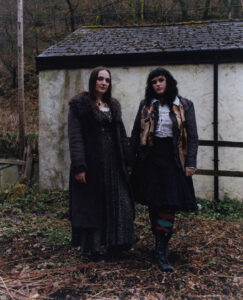
Adriana Szczerpa, 27 and Ellis Greenwood, 26
Adriana Szczerpa, 27 and Ellis Greenwood, 26 have been in a relationship for two years. Adriana was born in Poland but moved to Wigan in Greater Manchester at the age of 10, while Ellis was born and raised in Halifax. After meeting online while Ellis was living in London and Adriana in Manchester, their relationship began once Ellis returned to her native Yorkshire. They now split their time between Halifax and Haworth – both picturesque and quaint in their own unique ways, and a far cry from nearby queer hubs like Manchester and Leeds.
While Ellis’ family ties are part of what keeps them in the area, there’s a plethora of reasons that makes Calderdale so attractive to the duo. “Well I think the landscape is one thing!” Ellis says, gesturing to the surrounding woodlands. “I suppose there is the very real fact that a lot of queer people have lived here for some time, but whether or not that’s really representative of all queer people, I’m unsure. But I feel like there’s a lot of queer cultural events happening too.”
Both have person-centred job roles, with Ellis working as a psychologist in the NHS and Adriana working as a teaching assistant. For Adriana, she hopes that her job will educate the next generation and ensure that queer women are seen and known in everyday job roles. “Being able to be a queer teaching assistant – and a teacher one day – would be a good way to help children to understand that it is okay to be queer. It’s like being an advocate. Normalising it and bringing that teaching into the school environment.”
On the streets across Calderdale, you’re accustomed to seeing heterosexual couples exercising public displays of affection – kissing, cuddling, holding hands. I wonder what it’s like for queer couples, and whether Adriana and Ellis feel comfortable enough to hold hands in the area themselves. It’s an ongoing issue for queer couples, especially in an era when homophobic attacks are on the rise across the UK. “Yeah, it does feel natural. It actually feels like a no-brainer,” Ellis tells me. “I think 10 years ago, maybe less, I would have had those thoughts in my head around, like, a sense of unease in myself, but now it’s not even a thing I’d think twice about.”
I wonder how Adriana feels, especially after having what she describes as a “Catholic upbringing” in Eastern Europe and then Wigan: “You don’t get looked at in such a negative way around here. People are more used to queerness because everyone is so open about it. It feels more welcoming than Wigan, for example. From my perspective, it wouldn’t be as natural [in Wigan] as it is here, because I wouldn’t feel that openness or as comfortable,” she shares. “I feel that we can hold hands and be affectionate without it being judged [in Calderdale]. People might look but you can tell that it’s not perverse. They are just interested, and that’s not necessarily a bad thing because we are curious people!”
At the end of our conversation, I ask the couple to explain what feels so unique and special about Calderdale, and why so many queer people have either stayed here or chosen to live here. For them, it’s all about feeling like a part of a growing community and positive change. “Our experience of queer life across Halifax and the valley is marked by a sense of optimism, buoyed by the growing inclusivity, proliferation of queer-led collaborative spaces and initiatives, and the freedom to be openly ourselves without facing, or fearing, judgement,” they say.
Their answer – full of grace, openness and hope – echoes the feelings of the other individuals interviewed as part of the series. This moment of possibility and acceptance for Calderdale, I think, sheds some light on my own yearning to reconnect with the place I once called home.
This feature is taken from the May 2024 issue of GAY TIMES. Head to Apple News + for more exclusive features and interviews from the issue.
